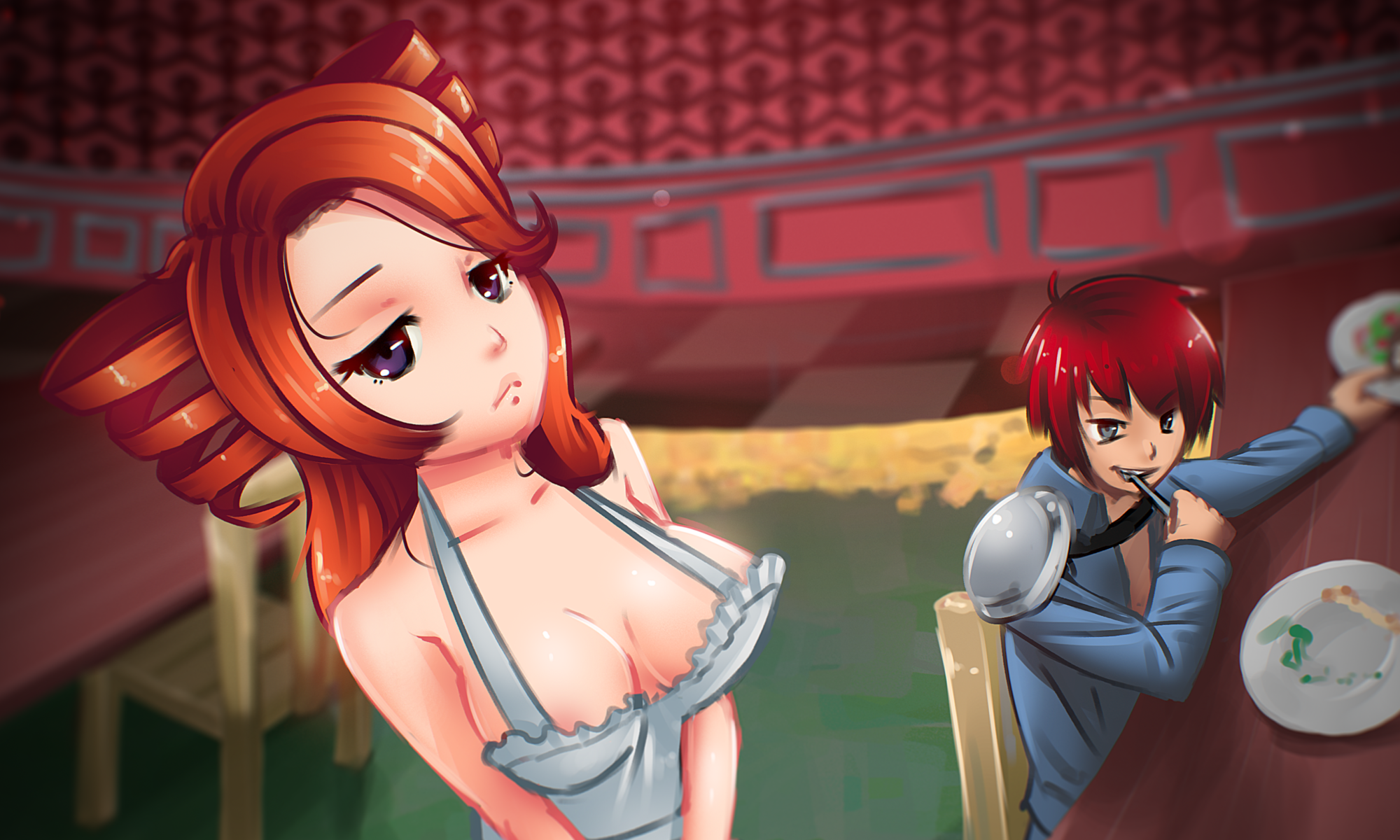It may surprise you to hear this, but I like playing paladins and good clerics on the few occasions I do get a chance to play D&D (or Pathfinder, I suppose). Part of it is that I don’t really mind being healer/buffer and letting everyone else do the damage. There are a few people in my regular tabletop RPing group who feel the need to be the high-damage powerhouses, so I don’t mind them taking all the attention in combat. Besides, if that subconsciously primes the GM to think that I deserve more “spotlight” outside of combat, all the better. But the other part is that I really don’t like playing the bad guy. My perverse fantasies aside, at the RPG table I prefer to be the paragon. Even in games like Vampire or Dark Heresy where you’re not really a “good guy”, I prefer characters who aspire to some kind of higher ideal.
The reason why I’m telling you all this is because when it comes to paladins, I know my shit. And I care about what being a paladin means.
So, what does it mean for Harem Collector?
There are four orders of paladins in the HC world, each devoted to being an exemplar of a single Angel’s virtues. Rather than priests, who are there to tend to the faithful, convert others, and protect individual communities, the paladins are meant to lead by example. They are not always successful in this, of course- those wacky paladins sure do make a big deal out of falling from grace- but their primary duty, even before the smiting of evil and whatnot, is to guide others by doing.
The largest order devotes themselves to the Angel of Law and Justice. As they serve the only male Angel, the order itself has a disproportionate number of men in it. This leads to rumours that the Law and Justice paladins are more than a little sex-deprived and repressed. At least that’s the stereotype, unless the paladin in question is a confirmed bachelor. Which does happen- more than a few paladins of this order joined for the opportunity to meet other men in a cloistered setting. More than a few of the female paladins of this order joined for the yaoi. Sex lives of the faithful aside, they mostly go about serving Angelic justice and enforcing Angelic law, which often takes the form of vigilantism, kangaroo courts, and trial by popular opinion. Hey, nobody said that being a paladin made you perfect.
The next largest order serves the Angel of Light and Mercy, who are basically classic paladins straight out of a PHB. Therese’s order is the one most often found joining adventuring parties and actually being active in the world- as I’ve mentioned elsewhere, this order means “Light” in the “taken into dark places” sense of the word. They take it upon themselves to protect the common folk, heal the sick, and generally be all-around good people. However, they are badly decentralized- they rarely gather in force and when they do in tends to be whoever happens to be at the order hall that week.
Third largest is the Order of Loyalty and Service. These are the least paladin-like paladins- because they usually end up swearing to some individual or organization that they find worthy, they often don’t end up out in the world, smiting evil and kissing babies. However, their oaths are no absolute- loyalty is a two-way street and someone who begins to act in an unworthy manner will find their paladin buddies deserting them. There are plenty of folktales involving a paladin of this order discovering that their “master” is corrupt somehow and betraying them, only to turn themselves in to their own order out of shame for such abject betrayal.
The smallest order is the one who follows the Angel of Peace and Comfort. The rare few individuals who find themselves dedicated to the least popular Angel become expert undead hunters, to grant the final peace and comfort of the grave to the unquiet dead. This is the only order not to have a tower at the Middle Kingdom citadel outside Westcastle, as the local paladins of this Order are too few to make much of a political impact. Luckily, their buddies at the Order of Light and Mercy are happy to provide space, as the two orders tend to get along famously.
It’s popularly thought that paladins must be celibate, but this is not the case. Of these orders, only the Order of Loyalty and Service demands celibacy, preaching that in order to devote themselves fully they cannot dilute their attention with lovers. Promiscuity is frowned upon, however, and marriage is rare. Masturbation is thought to be selfish- which is why a certain someone decided to go into hiding to cleanse herself of impure thoughts- and making use of prostitutes is strictly forbidden.
So why Therese keeps her powers after she is captured should be clear. She’s not actually breaking any of the rules of her order, as long as she still attempts to be an example to her peers. And by serving the Hero and exerting what little influence she can gain over him, well, that could be interpreted as taking a candle into a dark place as well. Maybe one day, she can goad him into being a Hero in a less ironic way.


Honestly, while I know the protagonist is canonically CN, I tend to play him as CG with a deeply skewed set of morals “Hey, the girls in my harem always end up happier than they were, I’m doing them a favor in the long run”. I always choose the ‘kindest’ available option when given a choice and I never resort torture to ‘convert’ harem-ettes.
Which is why it still irks me that there’s no way to resolve the cannery can-can in a way that favors the child workers more. I’d be satisfied with not getting any money from the investment in exchange for happier workers, but I think it would be funnier if the hero could do a hostile takeover (financially or violently, whichever) of the cannery to place it in the hands of the child workers. For extra hilarity, you could have the children outside the cannery spouting marxist propaganda afterwards, to underscore the whole “worker’s revolution” thing.
I have to say I like the idea with the cannery.
Though I presume that if such an option ever existed, getting relationship points with one of the girls for it (whoever would be most appropriate for it) would be a decent and in-theme reward.
And it would make sense for the hero to maybe actually do that in a moment of insanity or something, since he did live there for some time and might not be completely blind to the plight of theirs; even if he’d rather have gold.
The Hero sure has a pretty skewed approach to things. I wonder if saying any more would be saying too much…? Well, just make sure you know where your information is coming from.
Marxist orphans? Oh, that would be awesome!
I love that idea! But I think that these quest is set up that way for a reason and it’s to make a point so I don’t really expect that kind of development…
Thanks for another lore posting, NoMoshing.
I agree with the Cannery Can Can bit. I think there should be another option to expand the cannery further, to increase profit but also help the children (some of whom are female and may join the hero’s harem when they’re old enough). Also, the crates by the cannery should be moved so you can talk to Margaret(?), the girl missing some fingers, again. That was practically heartbreaking for me.
That actually makes a lot of sense. Also, thank you for including the “try” element in the paladins; that was always the one thing that annoyed me as when given the choice between being lawful or good (for the relative value of what those are), paladins are supposed to be the kind of people who’d choose good and then try to make up for the unlawfulness of their choice (just like Therese with her “trying to change the hero”) rather than be forced to be lawful no matter what that means or else lose their powers.
I mean, seriously, if paladins in games are supposed to be just and lawful, then when they encounter an unjust mockery of a law or an unlawful attempt at justice, they are supposed to interfere and try to change it somehow (good) rather than play along with this farce because it’s the law (lawful).
On that note, I don’t think the hero is actually “dark”. Warped and weird in his approach, sure, but he does have some sort of light even if it is UV or IR light. Because he’s not a bad guy; selfish, yes, but considering his upbringing that’s normal. Though he’s still an arse, but hey, whatever. And it’s not like I have to say that to the author …
I think original D&D and AD&D actually dropped the ball when they made it a requirement that paladins could only associate with other lawful goods.
I’ve done it all. At one point I had one of my paladins poke a finger in the chest of a fellow party member who was a NE thief, saying “With all we’ve been doing, the world is a better place with you in it. Pray that that never changes.” Another favourite for dealing with off-alignment party members is “If you are a good, lawful person just because I told you to, it would be meaningless. I hope that I can inspire you to want to be good.”
Then again, my favourite paladin quote evar is when my level 1 character was facing down a dozen or so guards after having just entered a LE city. “I can’t kill all of you, but I bet I can kill one or two of you before going down. So I want each of you to look deep down inside and ask yourself, is today the day you want to die?” Rolled a 20 on my intimidate check. It was awesome.
1) what about the Angel meline is champion of where’s her order of Paladins? Is meline technically the first ?
The Angel of Love and Peace doesn’t keep her own paladins. And Meline is not a paladin.
Meline’s closer to that Angel’s designated magical girl (or a power ranger) than to a paladin, to be honest. No requirements nor even anything, just the Angel going “hey, you’re cool, have powers”.
Except Meline doesn’t get a transformation sequence. 🙁
It was an interesting read. And learning how the world of HC works is always good.
Personally i don’t like paladins. Maybe too many game sessions with “self-righteous overly religious avatars of justice” is to blame. Also it often clashes with my usually chaotic aligned characters as well. I can sorta tolerate them, still.
But they can be a good source of humor too. In one campaign we played between friends, we had a human paladin, a gnome bard, a tiefling sorcerer and a dwarf psychopomp (me). On our first meeting after all introductions and greetings were exchanged our paladin asks “Um, what is a psychopomp”? And GM being a troll he is makes paladin to roll for a knowledge (religion) and it came as a 1. And his response was “You mostly slept during your theology classes at the order, but from what you can remember, these people are like necromancers something about the dead people. But not as bad. That’s important.” And so he mostly hated my guts through out the campaign, while i tried (mostly in vain) to explain why necromancer and psychopomps are different, what it actually means to be a psychopomp and why it’s a good thing. Many laughs were had.